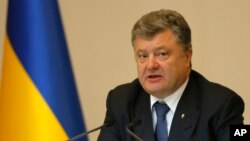Ukraine's president has instructed security officials to strike the names of three BBC journalists off the country's sanctions list, a day after he signed the decree, his spokesman said on Thursday.
Petro Poroshenko late on Wednesday signed a sanctions list barring nearly 400 individuals from entering Ukraine, including long-serving Moscow-based BBC correspondent Steve Rosenberg and producer Emma Wells, both British, and Russian cameraman Anton Chicherov.
The decree which was published on the president's website said the reporters and media executives on the list presented an unspecified “threat to national interests, national security, sovereignty or territorial integrity.”
Faced with a barrage of criticism over the ban, Poroshenko backtracked on Thursday. His spokesman Svyatoslav Tsegolko said Poroshenko asked the Ukrainian National Security and Defense Council, which was responsible for drafting the list, to take off the names of the BBC staff. Poroshenko announced his decision to the new British ambassador to Ukraine who presented her credentials to him on Thursday, Tsegolko said.
Ukraine's security council promptly issued a statement saying it “has supported the president's suggestion” to lift the sanctions from “selected European journalists.” The council said it will remove from the list three BBC journalists, two Spanish reporters and a German journalist.
The Spanish pair, Antonio Pampliega and Angel Sastre, disappeared in Syria in July and are believed to have been kidnapped by the Islamic State group.
The German, journalist and author Michael Rutz, said before his name was removed that he had no idea how he got on the list.
“I have never been to Ukraine and don't have any intention of traveling there in the near future,” he told German news agency dpa.
This is the first sanctions list against Russia and foreign individuals that Kyiv has introduced since a conflict broke out in April 2014 in eastern Ukraine, claiming more than 8,000 lives so far.
The BBC's foreign editor, Andrew Roy, described the move against the BBC journalists as “a shameful attack on media freedom.”
The Russian news agency Tass on Thursday described the decision to blacklist three of its reporters, one based in Washington, D.C., one in South Africa and one in Moscow, as “odd” since two of the three do not even cover Ukraine.
Poroshenko said in a statement accompanying the list that the sanctions were introduced against people and companies “linked to the annexation of Crimea and aggression in Donbas” in eastern Ukraine.
Most of the people on the sanctions lists are Russian politicians and political activists who have called for the annexation of Crimea and advocated for Russia's greater involvement in eastern Ukraine.
Ukraine has barred entry to Russian journalists in the past, accusing them of inciting unrest in the Russian-speaking east.
The New York-based Committee to Protect Journalists said in a statement that it is “dismayed” by Poroshenko's actions.
Ukraine Takes BBC Journalists Off Its Sanctions List
update




